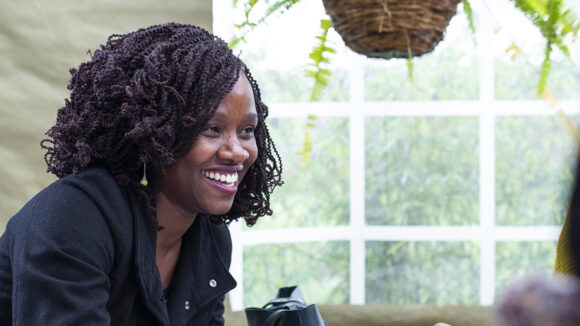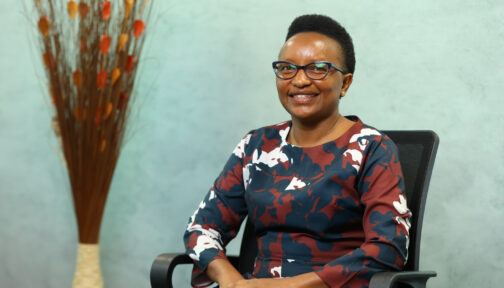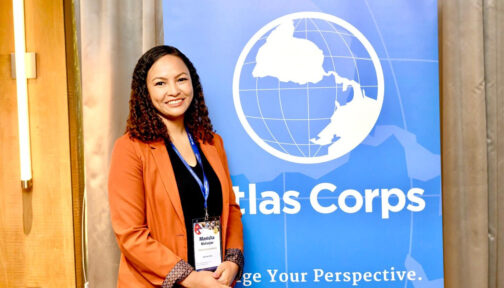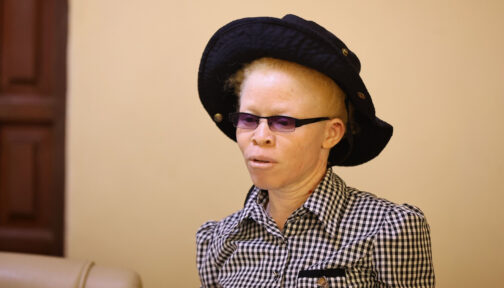Elizabeth Ombati: “People are left out because the workplace is totally not accessible for them”
Elizabeth Ombati is an OPD (organisation of people with disabilities) engagement officer with the Africa Disability Forum.
The Africa Disability Forum is a member of the International Disability Alliance – an Inclusive Futures partner.
Here she explains her experience with anxiety and how she is channelling this, alongside her passion for disability rights, into supporting other people with disabilities to gain jobs with employers that support them.
Liz’s story
“I graduated in 2007 with a diploma in journalism. I love to write a lot, and I chose journalism so I didn’t have to speak in front of people. I have major issues with anxiety, so I chose something that would fit my impairment. Now I realise that the environment I’m in should change to accommodate me.
“I found the newsroom quite intense, and it was really difficult back then to tell people that I had a mental health impairment. The unfortunate thing is, I hardly kept jobs and looking back, it was not really my problem – I did not have a safe space to share my condition and be accommodated.
“Many people think they are left out because of the impairments they have, but that’s not correct. They are left out because the workplace is totally not accessible for them. It’s far beyond the duty of a person with a disability to tell an employer to offer them reasonable accommodation in the workplace. Employers should know their duties under law and should reach out to their staff and improve the physical accessibility, or even the social environment of their offices.”
Supporting people with disabilities to thrive at work
“In my first job, I started off working behind a computer, which was a safe space for me. But my boss moved me to the front desk where phones were ringing all the time, and I could not keep up with that. When the telephone rang, my heart would beat really hard, and in my head, I would be asking myself: “Who is calling? What do they want?”
“I handed in my resignation within a week of being put at the front desk. Looking back, I wish I’d had the courage to tell my boss that I wouldn’t work well there. People with disabilities often hesitate in asking their employers for support, for fear of stigma. I wish employers would ask employees directly about what reasonable accommodation they might need.
Building a career in the disability movement
“In high school, people used to tell me that I had a bright future – but then you get to a point and you’re stuck. No career move, no education, no nothing. And you blame yourself, [thinking] that it’s because of the anxiety, so you keep feeling bad about yourself. But then I met a wonderful team at Users and Survivors of Psychiatry in Kenya (USP Kenya) who have supported me and built up my confidence along the way.
“Ten years later, I’ve built a good career. I am a disability rights self-advocate and a member of USP Kenya which works to promote and advance the rights of people with psychosocial disabilities.
“I recently completed a Fellowship programme with the International Disability Alliance, which trains disability rights advocates on including the rights of people with disabilities in progress towards the Sustainable Development Goals.
“I write a blog and I also contribute to the national newspaper in Kenya on disability and inclusion issues. So I didn’t completely lose my dream of working in journalism.
“In my work as an OPD engagement officer, I ensure the voices of people with disabilities are represented and heard. Amplifying the voices of people with disabilities, in all their diversity, fills my heart with so much joy. Being given the platform to do this work as a woman with a psychosocial disability – I’m a living example of what happens when people with disabilities receive support to achieve their potential.”
Engaging people with disabilities in decision-making
“Meaningfully engaging people with disabilities in all matters that concern them is critical to ensuring that our communities are just and inclusive, and that people with disabilities can fully engage in decision-making too.
“Part of my role involves reminding partners to ensure that everything they do reflects the letter and spirit of the Convention on the Rights of Persons with Disabilities and that people with disabilities (including groups that are particularly marginalised) and OPDs are meaningfully involved at every level of their work.
“My hope for the future is that we can help dispel the idea that employing people with disabilities is more costly than employing people without disabilities. It’s crucial that people with disabilities can talk to their employers and that they continually check for reasonable accommodation without an employee having to directly report having a disability. These conversations will ensure we move forward.”

Elizabeth Ombati
Disability rights advocate with the Africa Disability Forum.
How can you meaningfully engage OPDs in your work?
Use our guideMore from our people

Mellen Marucha: “Our starting point must be ensuring parents understand and embrace inclusive education”
Mellen Kemunto Marucha is the senior programme coordinator at Sense International in Kenya – an Inclusive Futures partner working with and for people with complex and multiple disabilities to ensure they have the right to live, learn and thrive in an inclusive society.

Manisha Maharjan: “Inclusion benefits everyone, not just those directly impacted”
Manisha is project manager for Humanity & Inclusion and leads our education project in Nepal, funded by UK aid under Inclusive Futures.

Lucy Odwar: “Women with disabilities face many challenges”
Lucy is a director in the department of gender, social services and disability inclusion in Homabay County government. Through her work as part of the Homabay County Disability Forum, she supports the Global Labor Program – Inclusive Futures.